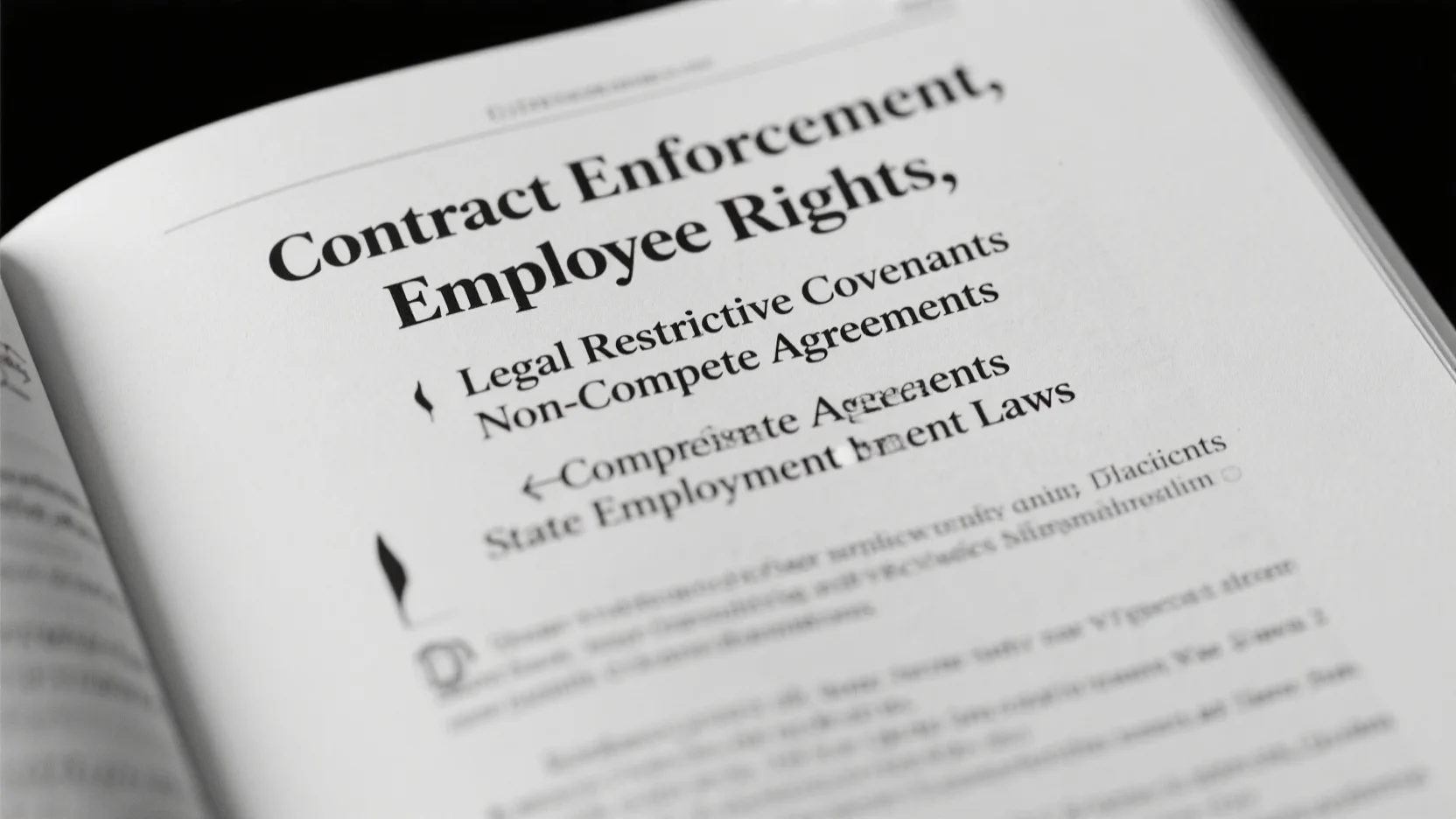Image Source: unsplash
Non-compete agreements restrict employees from working with competitors or starting similar businesses after leaving a job. These agreements aim to protect trade secrets and maintain a competitive edge. However, the enforceability of these agreements varies widely across states, which is why it’s essential to understand ‘Non-Compete Agreement Laws by State: What You Need to Know.’ For instance, in Texas, 60.7% of workplaces require some employees to sign non-competes, while in Illinois, this figure is 50%. Understanding state-specific laws ensures individuals safeguard their rights and employers remain compliant.
Key Takeaways
- Non-compete agreements control where and how you can work after quitting. Knowing these rules helps you protect yourself.
- Different states have different laws about non-compete agreements. Some states don’t allow them at all, while others allow them only in certain cases.
- Workers should read non-compete agreements closely before signing. Get legal help if something seems unfair or too strict.
Understanding Non-Compete Agreements
What Are Non-Compete Agreements?
A non-compete agreement, also called a covenant not to compete, is a legal promise that restricts an individual from engaging in similar business activities within a specific market for a defined period. These agreements often appear in employment contracts, business sales, or partnership agreements. Employers use them to protect trade secrets, customer relationships, and other proprietary information.
Key features of non-compete agreements include:
- Prohibiting employees from working for competitors or starting similar businesses.
- Restricting the use of confidential knowledge gained during employment.
- Limiting competition within a specific geographic area and timeframe.
The Federal Trade Commission (FTC) has expanded the definition of non-competes to include provisions like overly broad nondisclosure agreements and unreasonable training cost repayment clauses. These broader interpretations aim to prevent unfair restrictions on workers’ mobility and career growth.

Why Do State Laws Differ on Non-Competes?
State laws on non-compete agreements vary significantly due to differing views on their fairness and necessity. For example, California prohibits non-competes entirely, while states like Texas enforce them under specific conditions. Courts often evaluate factors such as adequate consideration, geographic scope, and time limitations to determine enforceability.
Before the FTC’s recent rulings, states had the primary authority to regulate non-competes. This led to a patchwork of laws, with some regions favoring employee rights and others prioritizing business interests.
Image Source: statics.mylandingpages.co
Key Factors Influencing Enforceability
Courts assess several factors to decide whether a non-compete agreement is enforceable:
| Legal Factor | Description |
|---|---|
| Necessity | Protects legitimate business interests, such as trade secrets or goodwill. |
| Time Limitation | Must have a reasonable duration, often ranging from six months to two years. |
| Geographic Restriction | Should be limited to a specific area relevant to the business. |
| Consideration | Employees must receive a tangible benefit, such as a promotion or bonus. |
Employers must carefully draft non-compete agreements to ensure they meet these criteria. Employees, on the other hand, should understand their rights and seek legal advice if they feel a non-compete is overly restrictive.
Non-Compete Agreement Laws by State: What You Need to Know
States That Ban Non-Compete Agreements
Some states have taken a bold stance by banning non-compete agreements entirely. These bans aim to promote job mobility, encourage innovation, and protect workers’ rights. California, North Dakota, Oklahoma, and Washington, D.C., are notable examples of jurisdictions that prohibit non-compete agreements in most circumstances.
| State | Ban Type |
|---|---|
| California | Complete ban |
| North Dakota | Complete ban |
| Oklahoma | Complete ban |
| Washington, D.C. | Complete ban |
Research shows that these bans have positively impacted local employment trends. Workers in these states experience greater freedom to switch jobs or start their own businesses, fostering a more dynamic and competitive labor market. However, employers in these regions must rely on alternative methods, such as nondisclosure agreements, to protect their interests.
States With Income Threshold Restrictions
Several states enforce non-compete agreements only for employees earning above a certain income threshold. This approach ensures that lower-wage workers, who are often more vulnerable, are not unfairly restricted. For instance, Washington requires a minimum income of $100,000 in 2024, increasing to $123,394.17 in 2025. Similarly, Colorado sets its threshold at $123,750 in 2024, while Maine uses 400% of the federal poverty level as its benchmark.
Image Source: statics.mylandingpages.co
These thresholds reflect a growing trend toward balancing employer protections with employee rights. By limiting non-competes to higher earners, states aim to reduce wage suppression and enhance job mobility for the majority of workers.
States With Moderate Restrictions
States with moderate restrictions on non-compete agreements strike a balance between protecting businesses and safeguarding employees. These states often enforce non-competes under specific conditions, such as reasonable timeframes or geographic limitations. Examples include Alabama, Arizona, and Florida, where courts evaluate the necessity and fairness of each agreement.
This middle-ground approach reflects the diversity of non-compete agreement laws by state. It allows businesses to protect legitimate interests while ensuring employees retain some freedom to pursue new opportunities. Historical data also reveals that moderate restrictions have evolved over time, influenced by court rulings and legislative changes.
Employer-Friendly States
Some states favor employers by enforcing non-compete agreements more readily. These states prioritize protecting trade secrets and maintaining competitive advantages. However, research indicates that this approach can suppress wages and reduce job mobility. Approximately 18% of American workers are bound by non-compete agreements, with many unaware of their rights.
To navigate these laws effectively, employers in these states must ensure their agreements meet legal criteria, such as protecting legitimate business interests. Employees, on the other hand, should seek legal advice to understand their options and negotiate terms when possible.
Notable Exceptions and Special Cases
Certain industries and professions face unique non-compete regulations. For example, healthcare workers in some states are exempt from non-compete agreements to ensure access to essential services. Similarly, lawyers have been prohibited from signing non-competes since the 1960s to uphold client rights.
These exceptions highlight the complexity of non-compete agreement laws by state. They underscore the importance of understanding industry-specific rules and seeking legal counsel when necessary.
Key Trends and Federal Developments
Image Source: unsplash
Recent Trends in State Legislation
State legislatures have increasingly focused on reforming non-compete agreements to address worker mobility and economic growth. Over the past decade, many states have introduced laws to limit the scope of these agreements. For example, several states now prohibit non-competes for low-wage workers, ensuring fair opportunities for those in vulnerable positions. Others have implemented income thresholds or restricted the duration of enforceable agreements.
This shift reflects a growing recognition of the impact non-competes have on innovation and entrepreneurship. States like Illinois and Oregon have recently updated their laws to provide greater clarity and protection for employees. These changes inspire workers to pursue new opportunities without fear of legal repercussions. Employers, in turn, are encouraged to adopt alternative strategies to safeguard their interests.
Federal Proposals and Their Potential Impact
At the federal level, proposals to regulate non-compete agreements have gained momentum. Lawmakers have introduced bills aimed at limiting the use of non-competes nationwide. These proposals seek to create a uniform standard, reducing the confusion caused by varying state laws.
If enacted, federal regulations could significantly impact both employees and employers. Workers would benefit from increased job mobility and higher wages, while businesses might need to rely more on nondisclosure agreements or other protective measures. The potential for a nationwide framework has sparked optimism among advocates for worker rights.
The Role of the Federal Trade Commission (FTC)
The Federal Trade Commission (FTC) has emerged as a key player in the debate over non-compete agreements. In recent years, the FTC has proposed rules to ban or limit non-competes, citing their negative effects on competition and worker freedom. These efforts align with the agency’s mission to promote fair practices in the marketplace.
The FTC’s involvement has brought national attention to the issue, encouraging states to reevaluate their own laws. By addressing the broader implications of non-competes, the FTC aims to foster a more dynamic and equitable labor market. Their actions highlight the importance of understanding "Non-Compete Agreement Laws by State: What You Need to Know" as these developments unfold.
Practical Advice for Employees and Employers
Tips for Employees to Protect Their Rights
Employees can take proactive steps to safeguard their rights when faced with non-compete agreements. First, they should carefully review the terms of the agreement before signing. Understanding the scope, duration, and geographic limitations is crucial. If any clause seems overly restrictive, employees should seek clarification or negotiate adjustments.
Learning from past legal cases can also empower employees. For instance, in the Prudential Security case, the court deemed the non-compete clause unreasonable and unenforceable. Similarly, in the Total Quality Logistics case, the agreement was found to be overbroad. These examples highlight the importance of challenging unfair clauses.
| Case Study | Outcome | Key Findings |
|---|---|---|
| Prudential Security | Noncompete deemed unreasonable | Despite the ruling, the company continued to use the same noncompete clause. |
| Total Quality Logistics | Noncompete previously held overbroad | The company persisted in using the same unenforceable noncompete. |
Employees should document any discussions or agreements with their employer regarding non-competes. This record can serve as valuable evidence if disputes arise later.
Tips for Employers to Ensure Compliance
Employers must stay informed about evolving non-compete laws to avoid legal pitfalls. Regularly reviewing and updating agreements ensures compliance with state-specific regulations. Transparency in employment practices fosters trust and reduces disputes.
Effective strategies include:
- Emphasizing transparency and respecting individual freedoms in employment practices.
- Reviewing agreements periodically to align with changing laws.
- Setting clear performance expectations to address employee concerns.
Employers should also tailor non-compete clauses narrowly to protect legitimate business interests. For example, government contractors often rely on these agreements to safeguard competitive advantages. However, enforceability varies by jurisdiction, making it essential to draft agreements with precision and context in mind.
When and Why to Seek Legal Counsel
Both employees and employers benefit from seeking legal counsel when dealing with non-compete agreements. Legal experts can provide clarity on enforceability, especially since these clauses vary significantly across jurisdictions.
| Evidence | Description |
|---|---|
| Non-compete clauses vary | Enforceability differs across states, making legal guidance essential. |
| Legislative changes | Potential updates to laws require expert advice to ensure compliance. |
| Court scrutiny | Courts increasingly scrutinize non-competes, emphasizing the need for counsel. |
Approximately 30 million U.S. workers are bound by non-compete clauses, which can limit career opportunities. Legal counsel helps employees understand their rights and explore options for challenging restrictive agreements. Employers, on the other hand, can use legal advice to draft enforceable clauses and avoid costly disputes. Seeking professional guidance ensures both parties navigate these agreements with confidence and clarity.
Understanding state-specific non-compete laws empowers individuals to make informed decisions. These laws continue to evolve, reflecting a shift toward protecting workers’ rights.
- The Treasury Department’s 2016 report revealed widespread misuse of non-competes, especially for low-wage earners.
- Surveys show that 36 to 60 million workers are bound by these agreements, limiting job mobility and wage growth.
Consulting legal professionals ensures clarity and confidence when navigating these agreements.
FAQ
What should employees do if they feel a non-compete agreement is unfair?
Employees should consult a legal professional. Understanding rights and exploring options can empower individuals to challenge overly restrictive agreements confidently.
Can employers use alternatives to non-compete agreements?
Yes, employers can use nondisclosure agreements (NDAs) or non-solicitation clauses. These alternatives protect business interests without limiting employee mobility.
Are non-compete agreements enforceable in every state?
No, enforceability depends on state laws. Some states ban non-competes entirely, while others enforce them under specific conditions.
💡 Tip: Always review state-specific laws and seek legal advice to navigate non-compete agreements effectively.





